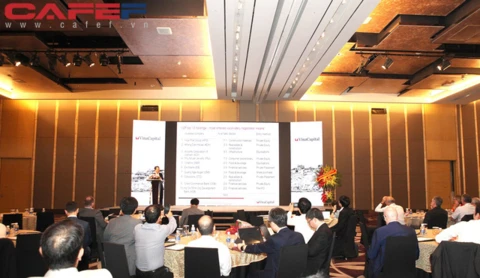 Conference attendees speak about ways to improve the business environment at a workshop in HCM City on October 24. (Source: VNA)
Conference attendees speak about ways to improve the business environment at a workshop in HCM City on October 24. (Source: VNA) HCM City (VNA) - Despite Vietnam’s rise in the global competitiveness index, further reforms are needed to achieve economic targets set by the Government, speakers said at a workshop in Ho Chi Minh City on October 24.
Nguyen Minh Thao, head of the Central Institute for Economic Management (CIEM)’s Business Environment and Competitiveness Committee, said that Vietnam had jumped 10 places to 67th in the Global Competitiveness Index (GCI), with 61.5 points, a rise of 3.5 points compared to last year.
The Global Competitiveness Report 2019, which compared 141 economies, was published by the World Economic Forum (WEF). According to the report, Singapore this year overtook the US to become the most competitive nation in the world.
The most significant reform of the business environment has been the reduction of conditional business lines, as well as the reduction and simplification of business conditions, Thao said.
Other major reforms include the use of electronic transactions in administrative procedures and cashless payments, and in inspection methods.
Thao noted, however, that the business environment still “has many barriers as ministries and agencies ‘compromise’ to abuse their management rights”.
Business conditions are still the main obstacle, she said, adding that newly issued business regulations are not practical and go against the direction of the Government.
Inspections conducted by authorised agencies are a major concern of businesses. “Some policy provisions are enforced differently among agencies, causing huge frustrations for businesses,” Thao said.
“Further reforms should include efforts to enhance competition to promote innovation, regulatory reform to improve allocation efficiency, and new plans to use public resources more effectively,” she added.
Nguyen Van Duc, deputy head of the legal department at the Vietnam Chamber of Commerce and Industry (VCCI)’s Branch in HCM City, said the government had launched e-government and promoted the digital economy while supporting a start-up ecosystem.
It has also been helping cities and provinces increase competitiveness indices.
“It’s important to accelerate growth in private sector employment, strengthen property rights, develop more competitive factor markets, and improve enforcement of competition policy,” he said.
The Global Competitiveness Index (GCI) is based on 12 pillars: institutions, infrastructure, information and communication technology adoption, macroeconomic stability, health, skills, product markets, labour markets, financial systems, market size, business dynamism, and innovation capacity.
The Global Competitiveness Report’s competitive indicators include gross domestic product, quality of overall infrastructure, effect of taxation on incentives to invest, and the availability and quality of information and legislation.
The workshop was jointly organised by the Central Institute for Economic Management and Aus4Reform./.
VNA






















